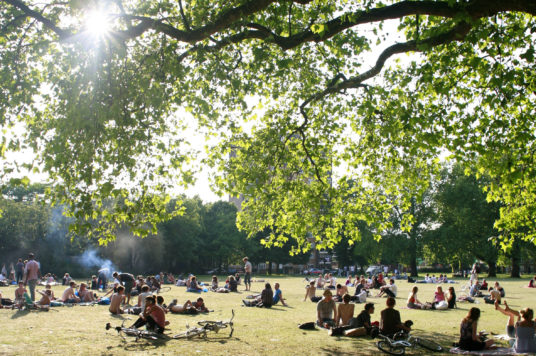Hospitals issue warning as weekend’s weather forecast looks more South of France than South London
Summer looks like it’s here at last – but with a surge in temperatures also meaning a surge in people visiting emergency departments, members of the public are urged to stay safe in the sun.
Earlier this week the UK Health Security Agency and Met Office issued their first heat-health alert of the year in six regions, including London and the South East, which comes into effect tomorrow (Friday) at 9am.
With the mercury set to peak at about 30 degrees Celsius, they are warning people to stay safe and well – and St George’s, Epsom and St Helier University Hospitals and Health Group is echoing that plea.
Dr Richard Jennings, Group Chief Medical Officer, said: “When temperatures start to soar, more people, especially those in high-risk groups, can suffer from illnesses like heat exhaustion, dehydration, and of course sunburn.
“It often means our hospitals are busier as a result. As always, we are there for those who need us, but please do take steps to stay safe and well, and avoid a trip to our emergency departments.”
High-risk groups include elderly people, babies, young children, and those with heart, respiratory and serious health problems. But everyone should stay safe and well in the hotter weather – and take the following steps:
- Looking out for people who may struggle to keep cool and hydrated, such as elderly relatives or neighbours
- Keeping windows closed when the room is cooler than outside, but opening them at night when the temperatures has dropped, and closing curtains on rooms that face the sun to keep indoor spaces cooler
- Drinking plenty of fluids and avoiding excess alcohol. Taking water with you, if travelling
- Trying to keep out of the sun between 11am and 3pm, and staying in the shade
- Applying suncream regularly, and wearing a hat
- Not exercising during the hottest parts of the day
Staying in the sun for too long increases the risk of becoming unwell. Heat exhaustion is not serious and usually gets better when someone cools down, but if this turns into heatstroke it needs to be treated as an emergency. You may have heat exhaustion if you are experiencing headaches, dizziness, loss of appetite, and feeling sick or confused.
If you are affected by any of these symptoms, it’s important to cool down as quickly as possible. There is more information on the NHS website on how to do this – and also what to do if your condition worsens.
The hospitals group is also reminding people that its emergency departments are there for serious and life-threatening emergencies – particular with a third wave of junior doctors’ strikes coming up next week, which will also have a big impact on services. Hundreds of doctors from St George’s, Epsom and St Helier could walk out over the 72 hours.
Dr Jennings added: “We often find we’re as busy in the days following a heatwave. The hot-weather alert is in place until Monday morning – less than 48 hours before many of our junior doctors will be taking industrial action.
“That’s why it’s even more important for the public to take steps to help us, help our staff, and of course, help themselves.”
If you need urgent medical help you should use NHS 111 online first, which can direct you to where you need to go.
Pharmacies, meanwhile, can offer advice and over-the-counter medicines for a range of minor illnesses, such as coughs, colds, sore throats, and aches and pains.
To find out more about staying safe during hot weather, visit the NHS’s website.
ENDS


